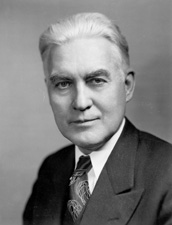Henrik Shipstead: Difference between revisions
imported>Yi Zhe Wu (he was farmer-laborite in senate, but earlier he wasn't) |
imported>Yi Zhe Wu (→Senatorial career: section) |
||
| Line 15: | Line 15: | ||
He supported declaration of war after the [[attack on Pearl Harbor]], but he continued to attempt to minimize U.S. involvement in foreign affairs. In October 1942, he voted against [[Selective Service]], as he had done so in 1940. | He supported declaration of war after the [[attack on Pearl Harbor]], but he continued to attempt to minimize U.S. involvement in foreign affairs. In October 1942, he voted against [[Selective Service]], as he had done so in 1940. | ||
===Opposition to United Nations=== | |||
In 1945, he was the only two senators to vote against the ratification of U.S. entry into the [[United Nations]], another one being [[William Langer]] from [[North Dakota]]. It was the culmination of decades of his opposition to foreign entanglements. Unlike many modern conservative critics of the UN, however, he not only feared that it would foster a world superstate but also that it would be used by the major powers to dominate smaller countries. His dissenting vote was one important reason for his loss of renomination in 1946. | In 1945, he was the only two senators to vote against the ratification of U.S. entry into the [[United Nations]], another one being [[William Langer]] from [[North Dakota]]. It was the culmination of decades of his opposition to foreign entanglements. Unlike many modern conservative critics of the UN, however, he not only feared that it would foster a world superstate but also that it would be used by the major powers to dominate smaller countries. His dissenting vote was one important reason for his loss of renomination in 1946. | ||
Revision as of 09:43, 7 July 2007
Henrik Shipstead (January 8, 1881 - June 26, 1960) was an American politician who served as a United States senator from March 4, 1923 to January 3, 1947, representing Minnesota. In the Senate, Shipstead was initially a member of the Minnesota Farmer-Labor Party from 1923 to 1941, but in 1941 he switched to the Republican Party and continued to serve in the Senate until 1947. He was primarily known for his ardent opposition to U.S. interventionism abroad.
Early life and career
Shipstead was born in Burbank, Minnesota in 1881 to Norwegian immigrant parents. He graduated from Northwestern University, Chicago in 1903. Then he practiced dentistry and was elected mayor of Glenwood in Pope County. He unsuccessfully ran for Congress in 1918, and for governor in 1920.
Senatorial career
In the beginning of his political career, Shipstead was a member of the Republican Party, however, in 1922 he launched a bid for U.S. Senate on the ticket of the new Farmer-Labor Party. He defeated the Republican incumbent Frank B. Kellogg and was elected to the Senate, and the election was cited as a major success for the party. He was the only Farmer-Laborite in the Senate, and served in the Foreign Relations Committee. In the Senate, his record was fairly progressive, as he supported the interests of farmers and the poor against the influence of big corporations. While his views were similar to the Farmer-Laborite platform, but he did not accept some members' extreme hatred toward capitalism.
After World War I, Shipstead opposed U.S. entry into the League of Nations and the World Court. He advocated for the cancellation of German reparations which he regarded as retaliative. On Latin America, he objected to the U.S. occupation of Haiti, the Dominican Republic and Nicaragua. He criticized Roosevelt Corollary to the Monroe Doctrine of 1905 as responsible for these unwise interventions. However, he did not view himself as an "isolationist". He opposed high tariffs, such as the Smoot-Hawley Tariff, arguing that high tariffs only benefited the wealthy and big businesses in detriment of the poor.
Shipstead defected from the Farmer-Labor party in the late 1930s, citing Communist influence in the party. He joined the Republican Party and was re-elected in 1940. However, the party switch did not bring much change to his political positions. He fought against Franklin D. Roosevelt’s efforts to make United States enter World War II, and aligned himself with America First Committee, an anti-war organization led by Charles Lindbergh.
He supported declaration of war after the attack on Pearl Harbor, but he continued to attempt to minimize U.S. involvement in foreign affairs. In October 1942, he voted against Selective Service, as he had done so in 1940.
Opposition to United Nations
In 1945, he was the only two senators to vote against the ratification of U.S. entry into the United Nations, another one being William Langer from North Dakota. It was the culmination of decades of his opposition to foreign entanglements. Unlike many modern conservative critics of the UN, however, he not only feared that it would foster a world superstate but also that it would be used by the major powers to dominate smaller countries. His dissenting vote was one important reason for his loss of renomination in 1946.
Later life
In 1946, he lost in the Republican primary to Governor Edward John Thye, when Thye and former Governor Harold Stassen's political faction dominated the state Republican Party.
Shipstead retired to rural western Minnesota. He died in Alexandria, Minnesota in 1960.
Sources
- Spartacus Educational
- Congressional Biographical Directory
- Henrik Shipstead Against the UN
- Senators Who Changed Parties During Senate Service
- The New American
- Minnesota - Political parties
Further reading
- Barbara Stuhler, "The Political Enigma of Henrik Shipstead," Ten Men of Minnesota and American Foreign Policy 1898-1968. St. Paul: Minnesota Historical Society, 1973. pp. 76-98.
